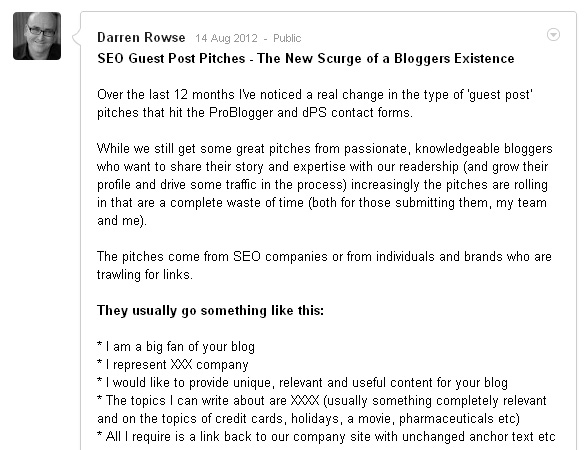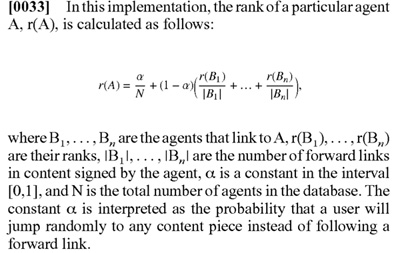There is a problem with guest blogging: SEOs have got hold of it. As with almost every link building method known to man, if there is a way to scale a process, SEOs will find it. Whilst there is nothing wrong with scalable methods per se, they are often irrevocably linked to a decrease in quality. Good SEOs will be able to maintain quality and use guest posts properly - as a means to build brand exposure and leverage new audiences, attracting qualified traffic as well as links - however, there will be plenty of SEOs who won't.
We get guest post pitches for our website all the time, and have recently noticed a drop in the quality of both the outreach and the content itself. Darren Rowse of ProBlogger summed it up recently in a wonderful rant on Google+
I urge you to go and read the full post and comments as it highlights the issue better than I ever could, with reaction from some prominent SEOs. But the problem is not just the pitches, it is also reflected in the content itself. I got very annoyed recently when someone had emailed us through some content to go on our blog. He was from an SEO agency, and was representing a client in a similar but non-competitive niche to ours, and as such was pitching content on a relevant topic. I made it clear that whilst we do accept guest posts, we were looking for quality content that added value and offered unique insight.
When he sent the piece through, it could be described 'article quality' at best. Although it wasn't duplicate copy, it was content that offered no new information and could quite easily have been put together by a semi-competent writer with a basic brief - so no 'expert' knowledge, insiders angle or specialist expertise.
Guest Posting For Links
This post was a clear example of an SEO company using guest posting for links. In my opinion, guest posting purely for links means missing out on a great opportunity to expand your audience and develop your brand, but it is nonetheless a current SEO practise. It has become widespread of late as it can provide in-content links in a neat and evidenced manner, that appear to be completely 'white hat' (i.e. Someone has made an editorial decision to link). As an industry we have got better at writing templated emails that feel relatively natural, have better tools for identifying prospects, and can use a range of syncronised platforms to enable effective scaling.
Whilst there exist some ingenious methods for outsourcing these processes, some people feel like they undermine the very principles of guest posting, succinctly (and angrily) put by Tad Chef on his blog recently.
Matt Cutts has made is perfectly clear what Google's stance on this sort of content is, during his recent interview with Eric Enge:
So how do you convince Google that people should care about your writing as much as Roger Ebert's?
Authorship
As I see it, Authorship will provide a means for Google to differentiate quality. As Matt Cutts stated in the example above, due to the reputation he has developed, people care about Robert Ebert's opinion simply because it is Robert Ebert's opinion.
One thing is clear from analysing their 'Agent Rank' patent - Google are very keen on verifying author accounts using their Google+ profile. They really want to know who you are. There are plenty of posts out there on Authorship giving advice on how to get a verified account, so I won't go into that. The verification process is very important as it allows Google to assign a 'digital signature' to pieces of content. This allows Google to assign a reputation score to authors based on the content they have 'signed':
- If a piece of content that I have 'signed' receives +1s, that would improve my reputation score.
- Moreover, not all +1s are equal, so a +1 from AJ Kohn has more impact than a +1 from AN Obody.
- Reputation can also be passed by links. If two pieces of content are signed by different authors, and author A links to author B's post, then author B would gain reputation.
- Again, not all links are equal. If AJ Kohn authors a post that is associated with his profile, and in it he links to a post that is associated with mine, that would have more impact than a link from AN Obody.
- Links from content that has not been 'signed' can still pass reputation to content that has been 'signed'.
The patent covers various implementations, so the points listed above are the ones I feel would be most likely for Google to actually use. One section goes on to offer an iterative procedure for deriving 'AuthorRank', which should look very familiar to anyone who understands PageRank:
As with PageRank, any reputation passed through a link is distributed across all the links within the content piece.
There are a few important upshots to AuthorRank:
- Digital signatures can be 'portable', so you can gain reputation points for content on any site, assuming it has been digitally 'signed' by a link to your G+ profile.
- Reputation affects search rankings. In general, a piece of content written by an author with high AuthorRank, will outrank an author with low AuthorRank.
- Reputation may be calculated relative to different topics, such that an Author would have a different rank with respect to each topic.
Whether Google can detect anything more than a broad topical association is up for debate, but it makes sense that an author cannot suddenly turn their hand to any old topic, and assume equal authority for each.
Using AuthorRank To Future-Proof Guest Posting
So, an author's reputation can be enhanced to positively affect search rankings, implying that Google is using these factors as indicators of trust and authority. If you incorporate authorship into your guest posting strategy you could use this to future-proof the value of guest post links. Simon Penson has been a long-time champion of using personas for content marketing and outreach; check out his YouMoz post for a detailed explanation of how they can be used effectively.
Personas can be used for guest posting alongside Authorshop, and I have outlined below some techniques to help improve AuthorRank. You would first need to segregate your guest posting topics and use a different persona for each one. These can either be real people in your business or fictitious ones that you make up. The important thing is that they have an active Google+ profile for them to build a reputation with.
- Use topic-specific freelance writers. They may take some hunting out but you want them to have 'expert knowledge' of a topic area.
- Target blogs that allow you to link your Google+ profile. Currently these will be few and far between, and may require you to become a regular contributor - but they will be worth it.
- Perform second-tier link building to your guest posts. Ross Hudgens explains how to use this technique to improve traffic and conversions, and it can also be used to pass reputation to any posts associated with your Google+ profile.
- Use Google+. Make sure you build out the circles for each persona's profile and spend time sharing and +1ing other content. Make use of the new sharing feature on G+ when you share with your circles - 'also send email', will alert them of your post and hopefully increase engagement.
- If Google releases the rumoured G+ commenting plugin for blogs , use it as another avenue to increase AuthorRank. Insightful blog comments that gain +1s and encourage replies from reputable G+ users could provide a nice reputation boost.
- If you accept guest posts on your own blog, implement Authorship markup for guest bloggers and encourage authority figures in your niche to give you a guest post. Those 'Further Reading' links through the content can pass AuthorRank back to you and your posts.
Keeping each persona laser targeted on a specific subject area will help if reputation is indeed assigned with respect to topic, and will help with future pitches and social proof. This setup would allow companies to control these personas as long-term assets, or be leveraged by agencies to attract other clients (e.g. 'We control persona x who has a strong reputation in your business niche').
Obviously, for a user to develop any significant reputation they will only get this by producing content of real quality. This is what will separate the SEOs that 'get it', and the ones that Darren Rowse was talking about in his rant. James Agate recently published an excellent post on scaling content production, which emphasises the importance of strong content ideas and quality control.
Is This Really Necessary?
I see it is a necessary step simply because Google may at some point decide that guest posts offer a link building method that is 'too easy'. I'm not suggesting that guest posts are spam, or even that Google detects them as spam. But if Google sees guest posting as a potential method to manipulate their algorithm, they will try and find a way to negate its value.
Due to the setup of guest posts (bio section at the bottom) it should be pretty easy for them to detect that something is 'probably a guest post'. I actually think that it must be pretty hard to algorithmically determine if a piece of writing is intrinsically 'good', so Google will presumably turn to social signals. Of course other factors will come into play, such as the trust and authority of the hosting website, but you could potentially avoid the issue altogether if your author has trust and reputation of their own.
I could simply say 'stop guest posting purely for links', but it is very rarely that straightforward. Whilst ever links remain an important ranking factor, link building will still be necessary, so there's no point in pretending that isn't one of the reasons that guest posts are used. Of course, when thinking about the long term, developing and executing a fully fledged content marketing strategy should be your number 1 priority.
Some of the ideas I have mentioned should help with the implementation of this, along with helping to protect some of your guest posts from potentially being devalued in the future.
However, it is probably not something that will reap immediate rewards.
It is also probably not something that will stop clients asking for their 'list of links' every month. But if your current tactics allow you to scale out low quality guest posts as a sure-fire link building method, Google will eventually get you. They've done it before with other linkbuilding methods, and they'll do it again. Take it from me.
If you liked this post, you might enjoy Writing Great Content Will NOT Get You Links
7 Comments
Comments are closed.





I’ve linked my Google+ profile on all of the websites that I can get admin backend access to, or have an email address on that domain. I also use My Blog Guest (and really like it) – the only problem is that this is not automatically built into the MBG system. The articles I write for other blogs are very high quality, and ones that I would want to have associated with my AuthorRank.
Is there are way around this, if you don’t have an email address associated with the domain, and don’t have administrative access to the site?
Hi Lee,
There is a way round this – get a rel=”author” link to your Google+ profile into the body copy of the article. If you control the html this should be straightforward, then you just need to add a link to the article on your Google+ profile in the contributor section.
Of course, getting this link in naturally may not be that straightforward, but if you get a bio section it is perfectly reasonable to say ‘Connect with me on Google+’ and make Google+ the link. Other than that you’ll have to find creative ways to get the link into your subject!
Good to see that you are taking authorship seriously, you will benefit from it in the future. The other option, when talking to site owners, is simply to ask them to implement authorship markup for guest authors. If you provide them with resources on how to do this and explain the potential benefits to them, you can only strengthen the relationship you have with them. Certainly for blogs in the SEO niche it should be a no brainer.
Thanks,
Patrick
I think you are spot on here, A great post. It SEO’s keep going the way they are and trying to promote crappy content Google will de-vaulate it.
thought the author rank can not be measured only by google+ followers. it can be also measured by twitter follower, facebook fans, and social authority site like stumbleupon and reddit fans. but who tracks them, no one. only because of google is searching engine and they are the who control your website traffic, they are giving bait so you can be trapped into people get starting to use google social networking website over others. But one thing to know what people dont like they really dont like. So authorrank on the basis of google+ not alone make you are bad writer.
my thoughts. and no offence to google.
Hi Hemendra and thanks for the comment. I agree that one of the factors for Google focusing on this is to encourage usage of their product Google+. But in reality you are only talking about a very small proportion of users who might be incentivised by this. The general population will not care either way.
I agree that other social signals can be considered, but I doubt they would have anything like the power of G+ signals. The main reason for this is the one of identity. With a properly verified account Google KNOW you are the author of a piece of work, rather than simply guessing as they would be for other social networks.